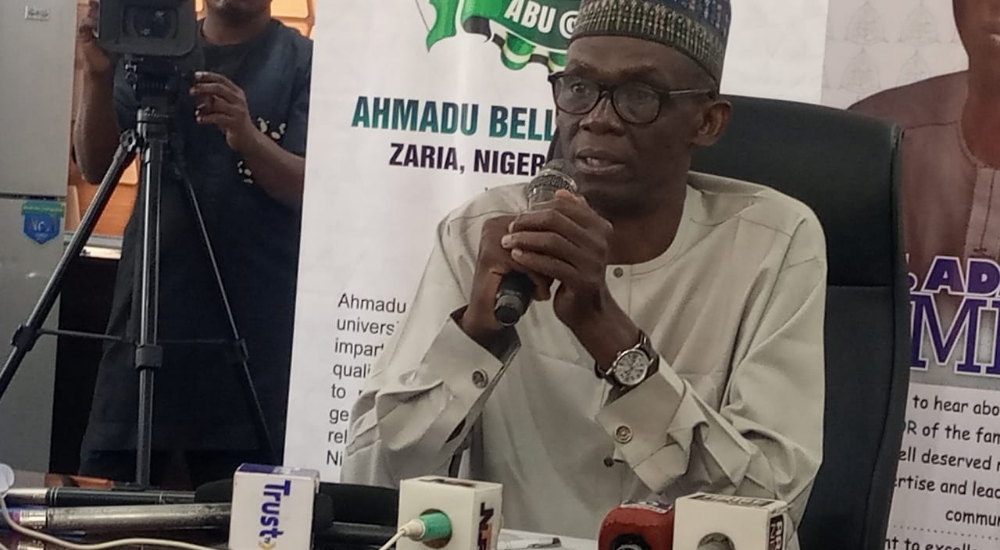The Ahmadu Bello University, Zaria, Kaduna State, has cried out over the rising cost of electricity, revealing that it spends nearly N4bn annually on energy — a burden its Vice Chancellor, Prof. Adamu Ahmed, described as “crippling and unsustainable.”
Speaking at a press conference to mark the university’s 63rd anniversary at the Senate Building, Main Campus, Samaru, on Saturday, Ahmed said the staggering energy bill had become a major drain on the institution’s finances and a threat to its core mandate of teaching and research.
Advertisement
“The university spends close to N4bn every year on energy. This figure is not only shocking but clearly unsustainable. It is crippling our operations and undermining our ability to deliver quality education and conduct meaningful research,” the VC said.
He explained that ABU could no longer rely solely on the national grid, which he described as unreliable and expensive, noting that the institution had started looking inward for sustainable energy solutions to cut costs and improve efficiency.
According to him, the university had embarked on a renewable energy drive to achieve self-reliance, encouraging staff and students to innovate while engaging with development partners for long-term solutions.
Ahmed disclosed that the Federal Government had recognised the university’s energy crisis and intervened with an initial N1bn support through the Tertiary Education Trust Fund (TETFund) last year.
Advertisement
He added that another project to deliver 10 megawatts of renewable energy had been approved to provide stable and affordable power to the institution.
“We have also reached out to our alumni, particularly the SBS Class of 1975, who are implementing a solar-powered project for one of our CBT centres. ABU is taking its destiny into its own hands while continuing to seek external support to sustain growth,” he said.
The Vice Chancellor, who described the anniversary as a moment of reflection, recalled that ABU was established in 1962 by the late Premier of Northern Nigeria, Sir Ahmadu Bello, to serve as a bridge of unity and progress for the entire country.
“Sir Ahmadu Bello founded ABU to train the manpower required for the development of Northern Nigeria and, by extension, the whole country. He envisioned an institution rooted in service, excellence, and unity,” he added.
He lamented that insecurity and poverty had slowed down development in the North and disrupted education, saying the university would now channel its research and advocacy towards addressing those challenges.
Advertisement
“Insecurity and poverty have undermined the North’s development and affected educational growth. ABU will intensify research, agricultural innovation, and policy advocacy to help restore hope and stability to our region,” he said.
The VC revealed that the university had begun advocacy visits to northern state governments, urging closer collaboration with academic institutions to develop evidence-based solutions to insecurity, food scarcity, and unemployment.
Highlighting ABU’s extensive agricultural assets, including the Institute for Agricultural Research (IAR), the National Animal Production Research Institute (NAPRI), and the Faculty of Veterinary Medicine, Ahmed said the university remained the most resource-endowed agricultural research institution in West Africa.
“No other university in West Africa has the kind of agricultural research capacity we possess. We have the knowledge, the manpower, and the facilities to drive food security and rural development,” he said.
Ahmed also stressed that insecurity in the region could not be solved through military means alone, advocating non-kinetic approaches such as dialogue, civic engagement, and community peacebuilding.
“You cannot solve insecurity by force alone. It requires dialogue, understanding, and the involvement of communities. We have the capacity, the research, and the networks to lead that charge,” he added.
Advertisement
Reflecting on ABU’s growth over the decades, Ahmed noted that the university had expanded from four faculties, 15 departments, and 426 students at inception to 18 faculties, 110 departments, seven institutes, four colleges, and 17 research centres, making it the largest university system in sub-Saharan Africa with over 50,000 students.
He said the university’s excellence had earned it global recognition, with Times Higher Education ranking it as Nigeria’s best public university in 2025.
ABU, he added, also received the JAMB award for internationalisation and diversity and is one of only three Nigerian universities listed in the QS 2025 World University Rankings.
Ahmed further disclosed that the university had secured three World Bank Centres of Excellence grants worth over $15 million, alongside a €5 million Horizon grant for an artificial intelligence project developing smart microscopes to enhance the diagnosis of neglected parasitic diseases.
“Our researchers have registered over 30 patents locally and internationally. These span renewable energy, pharmaceuticals, and crude oil refining technologies, a clear indication of ABU’s global relevance in research and innovation,” he said.
Despite these feats, Ahmed expressed concern over dwindling funding, brain drain, and infrastructure decay, which he said continued to threaten the university’s sustainability. He announced that ABU would intensify efforts in digital learning, research commercialisation, and start-up incubation to achieve financial resilience.
“Funding remains a major challenge. We are therefore focusing on digital education, commercialising research, and nurturing start-ups from our innovations to make ABU more self-sustaining,” the VC said.
He also appealed to the institution’s alumni across Nigeria and abroad to support their alma mater through endowments, donations, and mentorship of younger scholars.
“Our alumni are ABU’s greatest strength. The Sardauna gave you an opportunity; now it’s time to give back. You have the resources, the influence, and the talent to secure the future of this great university,” Ahmed said.
As the university celebrates its 63rd anniversary, the Vice Chancellor reaffirmed ABU’s commitment to the founding ideals of unity, service, and excellence.
“We have come a long way, but the journey continues. ABU will keep shining as a beacon of hope, knowledge, and national integration,” he added

